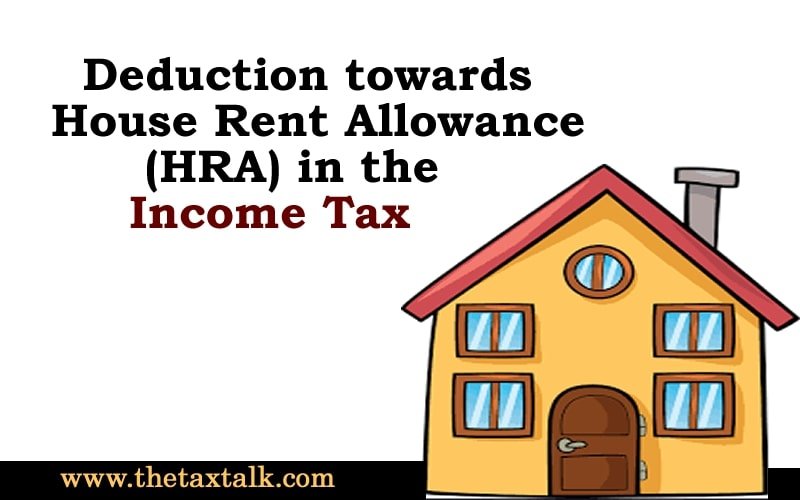![]()
Deduction towards House Rent Allowance (HRA) in the Income Tax
- One of the common component so salary income is House Rent Allowance(HRA) which is received by an employee from their employers.
- The question of HRA deduction doesn’t arise in case of self employed person as no HRA is received or receivable by such businessmen.
- HRA is often the part of the salary package and is paid in accordance with the terms and conditions of employment.
- HRA is given to conpensate towards the cost of a rented house taken by the employees for their stay.
- The Income Tax Act allows for deduction in respect of the HRA paid to employees. However, entire HRA is not deductible & is subject certain terms and conditions.
- The exemption on HRA is covered under Section 10(13A) of the Income Tax Act and Rule 2A of the Income Tax Rules.
- Only those employees can claim exemption on House Rent Allowance (HRA) who are staying in a rented house and is in receipt of HRA from his employer.
- In short, in order to claim the deduction, an employee must actually pay rent for the house which he occupies.
- In case one stays in an own house, nothing is deductible and the entire amount of HRA received is subject to tax.
- Amount of Deduction:
So long as the rented house is not owned by the assessee, the exemption of HRA will be available up to the minimum of the following three options:
i) Actual House Rent Allowance (HRA) received from your employer
ii) Actual house rent paid by you minus 10% of your basic salary
iii) 50% of your basic salary if you live in a metro or 40% of your basic salary if you live in a non-metro. - The place of residence is significant in HRA calculation as for a metro the tax exemption for HRA is 50% of the basic salary while for non-metros it is 40% of the basic salary. This holds true especially when you work at a metro and reside at a non-metro.
- Salary for above calculation would mean basic salary which includes dearness allowance if the terms of employment provide for it, and commission based on a fixed percentage of turnover achieved by the employee. The deduction will be available only for the period during which the rented house is occupied by the employee and not for any period after that. Salary means (Basic + D.A + Commission based on fixed percentage on turnover).
- Salary is to be taken on due basis in respect of the period during which the period accommodation is occupied by the employee in the previous year.
- In short, for calculating HRA exemption, one has to consider following four factors
a) salary
b) HRA received,
c) actual rent paid and
d) where you reside (metro or non-metro). - HRA & Parents:
One can pay rent to the parents & can claim deduction towards HRA. There is no specific bar on this. - Taxpayers need to submit proof of rent paid through rent receipts to the employer along with the signature of the person who has received the rent, along with other details such as the rented residence address, rent paid, name of the person who rents it etc.
- Simultaneously tax benefits on my home loan and HRA:
Its one of the most common question. It may be noted that the tax benefits for home loan and HRA are two separate & independent deductions and have no direct bearing or nexus with each other.
As long as taxpayers are paying rent for an accommodation, they can claim tax benefits on the HRA component of the salary and also can avail the tax benefits of the home loan.
This could be the case if your own home is rented out or you work from another city etc.
Let us have a look at Rule 2A which provides for exemption from HRA U/s 10(13A)]
2A. The amount which is not to be included in the total income of an assessee in respect of the special allowance referred to in clause (13A) of section 10 shall be—
(a) the actual amount of such allowance received by the assessee in respect of the relevant period; or
(b) the amount by which the expenditure actually incurred by the assessee in payment of rent in respect of residential accommodation occupied by him exceeds one-tenth of the amount of salary due to the assessee in respect of the relevant period; or
(c) an amount equal to—
(i) where such accommodation is situate at Bombay, Calcutta, Delhi or Madras, one-half of the amount of salary due to the assessee in respect of the relevant period; and
(ii) where such accommodation is situate at any other place, two-fifth of the amount of salary due to the assessee in respect of the relevant period,]
whichever is the least.
Explanation : In this rule—
(i) “salary” shall have the meaning assigned to it in clause (h) of rule 2 of Part A of the Fourth Schedule;
(ii) “relevant period” means the period during which the said accommodation was occupied by the assessee during the previous year.]

